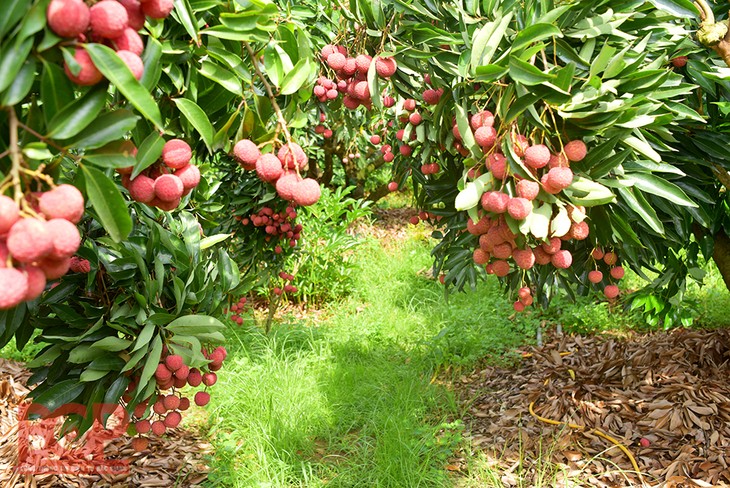 Luc Ngan lychee in harvest season (photo: tuoitre.vn) Luc Ngan lychee in harvest season (photo: tuoitre.vn) |
B: Paul, it’s great to know you’re still DX’ing. Paul said: “The overall reception of the program on June 3 on 11885 khz was good. The signal strength was strong and there was only slight fading of the signal. There was no interference from other stations.”
A: The Village Life segment he listened to was about mango production, and the Culture segment he heard introduced music of the Central Highlands. Both stories gave a good perspective on life in Vietnam, he said.
B: Thank you very much, Paul, for listening to VOV’s English program and writing to us again. It’s good to hear that your wife and two children are well.
A: Paul said: “Various wildlife can be found on my property and in the surrounding countryside: Western Grey kangaroos, koalas, and various birds. I’ve included in this report some photos I’ve taken of the native wildlife and birds that frequent my garden.”
B: His lovely photos show the unspoiled nature on his property. Thank you very much for sharing these photos with us, Paul. We hope to receive more letters from you soon.
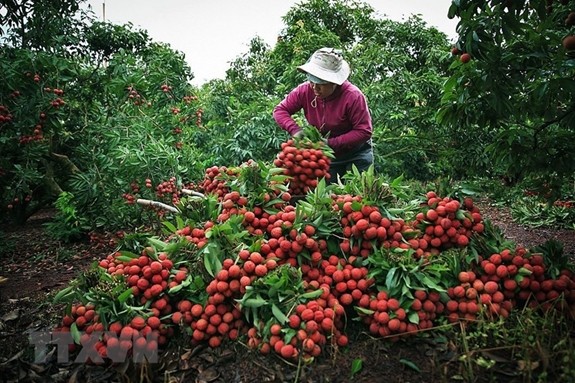 Harvesting lychees in Luc Ngan district, Bac Giang province (photo: VNA) Harvesting lychees in Luc Ngan district, Bac Giang province (photo: VNA) |
A: Many of our listeners have asked us about Vietnam’s export of tropical fruits, after reading or hearing news about Vietnam’s fruit exports to China, Japan, Australia, the US, and Europe.
B: Vietnam already exports to the US 6 types of fruit: dragon fruit, mango, lychee, longan, rambutan, and star apple. Final negotiations are now being conducted to permit the export of passion fruit to China and green-skin pomelo to the US.
A: The Ministry of Agriculture and Rural Development says China has given permission for a pilot program to import Vietnamese passion fruit into Guangdong province from Vietnam’s Lang Son and Quang Ninh province. The fruit must have valid growing area and packaging codes, meet food safety standards, and satisfy other criteria such as plantation, distribution, and disease control codes.
B: For the Japanese market, which already imports Vietnamese dragon fruit, lychee, and mango, the Ministry is negotiating the export of longan that has undergone a new cold processing method.
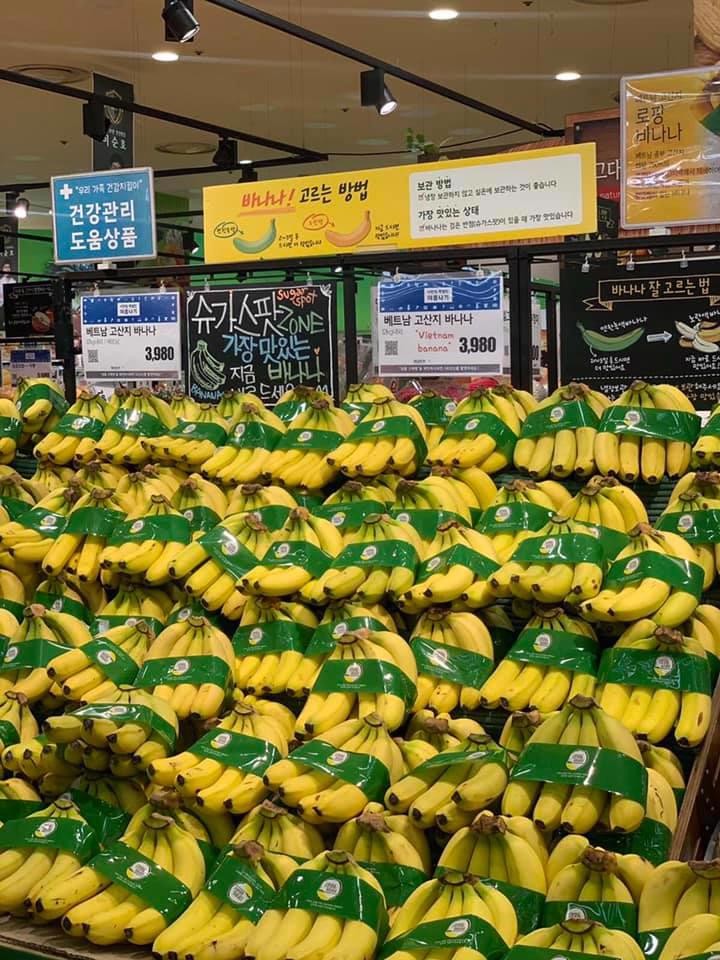 Vietnam's bananas sell at iMart in South Korea in July, 2020. (photo: VNeconomy.vn) Vietnam's bananas sell at iMart in South Korea in July, 2020. (photo: VNeconomy.vn) |
A: In the first half of this year Japan imported more than 1,500 tons of bananas from Vietnam worth 1.3 million USD, a 40% increase in volume and 30% increase in value.
B: According to AEON Co Ltd., Japan imports bananas from several markets, including Ecuador, Mexico, Guatemala, Peru, and Costa Rica. Vietnamese bananas have managed to gain a foothold in Japan, however, thanks to their competitive price and delicious flavor.
A: Summer is the season for several tropical fruits in Vietnam. Lychees are now in the harvest season in Bac Giang and Hai Duong provinces. Last year lychees had a good season, but the COVID-19 epidemic made selling them difficult.
B: This year Bac Giang province expects to sell more than 100,000 tons of lychees, 60% in Vietnam and the rest mainly to China.
A: Vietnamese lychees are also exported to the US, the EU, Japan, South Korea, Australia, Malaysia, the United Arab Emirates, and Singapore, and will soon be available in Thailand, Canada, and many Middle East countries.
B: We’d like to hear from you which Vietnamese agricultural products are sold in your country.
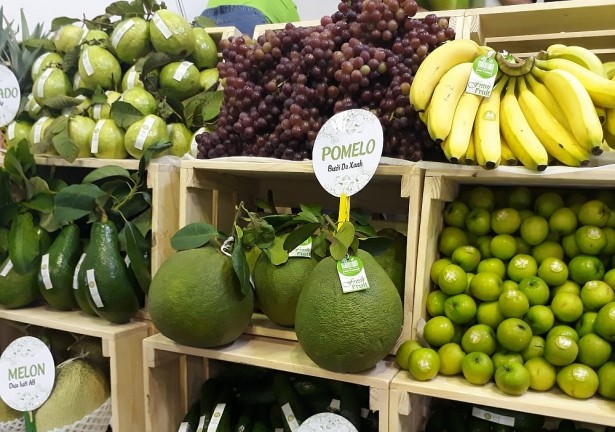 Vietnam's typical fruits Vietnam's typical fruits |
A: Bidhan Chandra Sanyal regularly visits VOV’s website to read the news. He wrote: “It’s good news that Vietnamese female scientist Ho Thi Thanh Van has won the UNESCO Prize. Ho Thi Thanh Van, a chemist, was one of 15 female scientists to win the International Rising Talent award under UNESCO’s Women in Science program. This honor is a source of pride for Vietnam and its female scientists. We’re proud, too, of Vietnam's outstanding contribution to the development of science.”
B: Dr Van’s research project made use of new multifunctional nanomaterials as catalysts to improve battery performance. Van, a lecturer at Ho Chi Minh City University of Natural Resources and Environment, was selected from 250 nominated researchers from around the world. This is the third time since 2015 that a female Vietnamese scientist has won the award.
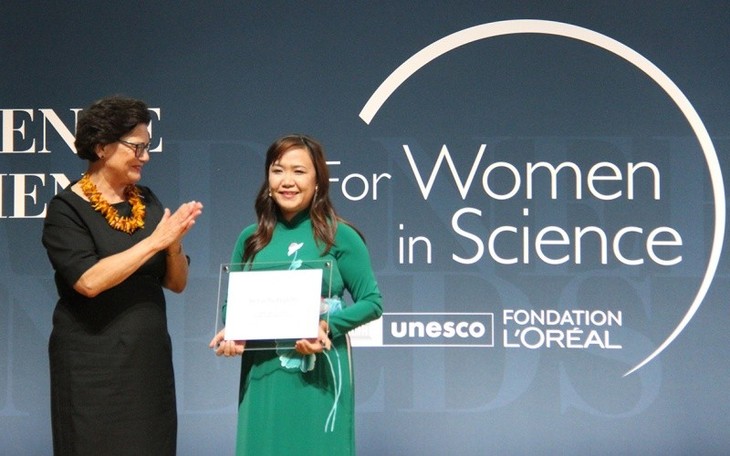 Dr. Ho Thi Thanh Van wins the International Rising Talent award under UNESCO’s Women in Science program. (photo: nhandan.vn) Dr. Ho Thi Thanh Van wins the International Rising Talent award under UNESCO’s Women in Science program. (photo: nhandan.vn) |
A: The L’Oreal-UNESCO Women in Science Award was launched in 1998 to encourage women’s intelligence, creativity, and passion for science. Since then it has honored 112 female scientists worldwide and has given financial support to 3,800 female scientists from 110 countries and territories.
B: Mr. Sanyal also saw our story about blood donation in Vietnam in response to World Blood Donor Day. He wrote: “Blood donation is undoubtedly a selfless and noble act. It’s not possible for everyone and not everyone comes forward. Those who do, perform a great service to society and achieve the virtue of giving life. Blood donation is a great gift. One donation can save a life. What greater gift could there be?”
A: Every year, Vietnam needs 2 million blood units for emergency aid, medical treatment, and as reserves for accidents, disasters, and epidemics. The voluntary blood donation movement has grown, attracting donors from all social strata, students, civil servants, soldiers, health care workers, and religious followers.
B: The Director of the National Institute of Hematology and Blood Transfusion says public awareness has improved considerably compared to 5 or 10 years ago. Despite COVID-19 fears, whenever the Institute faces a blood shortage, it only needs to issue an appeal and thousands of donors appear the next day. Shortages are no longer a concern if every healthy person is ready to share their blood, he said.
A: An event honoring 100 outstanding blood donors nationwide, particularly during the COVID-19 outbreaks, is slated for mid-August. Last year 100 blood donors were honored, including 14 people who donated blood more than 50 times.
B: In Vietnam, about 99.96% of the population are Rh positive. An Rh negative blood type is extremely rare. Consequently, an Rh negative individual is at grave risk if they have an accident and need a blood transfusion as a hospital might not have this rare blood type on hand.
A: People who share a rare blood type have started connecting with each other to provide a lifeline in cases of emergency.
B: There are now rare blood clubs in many parts of Vietnam. The northern region club, established in 2007, now has more than 500 members, who have donated approximately 3,000 blood units so far.
A: This week we’d like to acknowledge emails and letters from Fumito Hokamura of Japan, Christoph Paustian of Germany, Ivan Lebedev of Russia, and Hafizur Rahaman, Siddhartha Bhattacharjee, and Shivendul Paul of India, and many other listeners.
B: Thank you all for tuning in to VOV and sending us your feedback. We welcome your comments at English Service, VOVWorld, the Voice of Vietnam, 45 Ba Trieu street, Hanoi, Vietnam.
A: Our email address is: englishsection@vov.vn. You’re invited to visit us online and leave your comments at vovworld.vn. Once again, thank you all for listening. Goodbye.